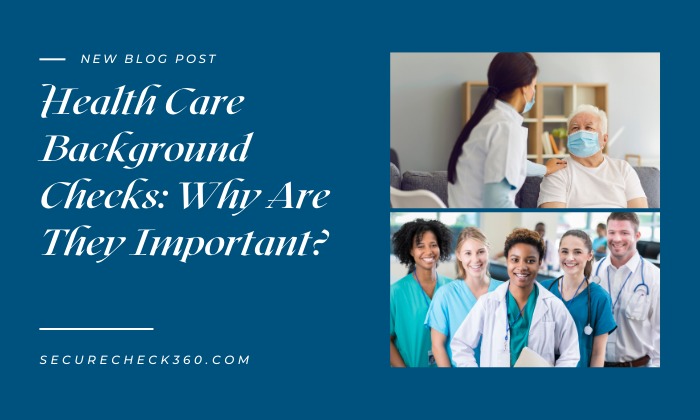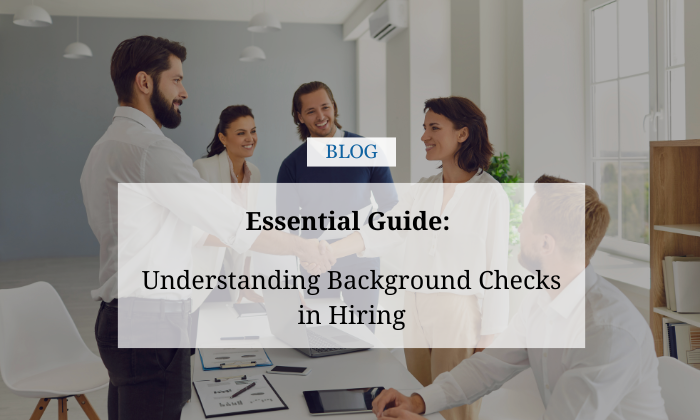The healthcare field is a dynamic industry that demands unique attention and adaptability.
With healthcare being subject to constant federal and state-mandated adjustments, it exhibits more fluidity and variability compared to many other sectors. As a result, individuals working in healthcare must possess exceptional training and the ability to deliver top-notch patient care.
For employers, achieving these goals can often prove more challenging than it sounds. Thankfully, this is where the value of healthcare background checks truly shines.
Securecheck360
Here at Securecheck360, we’re experts in delivering top-notch Employment Background Screening Services, serving businesses of all sizes across the globe. Our customized solutions are finely tuned to meet the unique requirements of small, mid-sized, and large organizations. We’re dedicated to equipping companies with the vital tools and insights they need to make well-informed hiring choices. As one of the leading background verification companies, we’re committed to supporting even small businesses as trusted background check companies for small businesses to ensure they have the confidence to build the best teams for their success.
To know more about our services, book your free demo today!
Why are Healthcare Background Checks Important?
While some employers might view comprehensive background checks as excessive, they are the only way to ensure you’re making the right hiring decisions and preventing potential issues down the road.
According to a study by the U.S. Department of Health and Human Services Office of the Inspector General (DHHS OIG), 19% of nurse’s aides with substantiated findings of misconduct had prior convictions on their records, with 53% having prior theft convictions. Those with abuse or neglect findings were three times more likely to have prior crimes against persons.
Healthcare background checks are essential for:
- Confirming qualifications for job roles.
- Safeguarding patients and staff.
- Reducing negligent hiring risk.
- Promoting transparency in hiring.
- Ensuring ongoing compliance.
- Tailoring checks to specific healthcare roles, from physicians to aides.
Remember, the depth of background checks varies based on the healthcare position, with physicians typically undergoing more extensive evaluations than nurses or medical assistants.
Healthcare Background Check Requirements
The criteria for healthcare background checks can vary based on the conducting organization, the specific job role, and the desired depth of the check. However, most healthcare-oriented background checks typically encompass the following components:
- National Criminal Search: This search scours extensive databases to uncover criminal records at a national scale, drawing from millions of records across various jurisdictions and databases. It also checks offender registries from all 50 states, including territories like Guam and Puerto Rico, as well as Washington DC.
- National Sex Offender Search: An essential component, this search gathers data from all 50 states, U.S. territories, and the District of Columbia, with the aim of identifying individuals charged, convicted, or pleading “guilty” to sex crimes. Given the regular contact healthcare professionals have with vulnerable populations, this search is crucial.
- Identity Verification Check: This step ensures the applicant’s identity matches their provided information, ensuring that subsequent background checks evaluate the correct individual.
- Drug Screening: Particularly critical in healthcare, this checks for substance abuse history. Healthcare workers often have access to prescription drugs, making it essential for employers to know about any substance abuse history, especially since it’s not uncommon among highly-trained healthcare providers.
- Past Employment and Education Verification: Healthcare roles usually require specific degrees or technical training, making education and employment verification crucial to confirming an applicant’s qualifications. Employment verification also helps identify any prior issues, such as negligence, in previous jobs.
- Federal Exclusion Search: This search allows employers to access the U.S. Government list of healthcare workers prohibited from receiving federal funds. It helps identify candidates with criminal records who might hinder your organization’s participation in federally funded programs like Medicare.
- Additional Considerations: Regardless of the above requirements, all positions, including those in nursing homes, should involve checking healthcare sanctions and potential exclusions at both state and federal levels. Additionally, continuous monitoring should be in place to alert employers if an active caregiver encounters legal issues or disbarment during employment.
What Disqualifies You From Working in Healthcare?
There are several factors that can lead to disqualification for healthcare job applicants, including roles like physicians, nurses, CNAs, EMTs, pharmacy technicians, and more. Here are some common red flags found during healthcare background checks:
- Certain Criminal Convictions: Healthcare workers often have direct access to patients, so specific criminal convictions can be disqualifying. These convictions may include drug abuse, theft, elder or patient abuse, sexual offenses, and others.
- Misrepresentation of Past Employment: Some applicants provide false information about their previous jobs on their resumes or applications to hide employment gaps or other issues. Healthcare organizations that verify employment can easily detect discrepancies, and dishonesty can result in denial of employment.
- Misrepresentation of Education: Applicants may also misrepresent their educational history or the institutions they attended. Employers that request education verification can verify attendance, degree or diploma status, and attendance dates. Falsifying educational background often leads to employment rejection.
- Sanctions or Exclusions: Applicants seeking positions with healthcare organizations that contract with Medicare or Medicaid may face disqualification if they appear on the Office of the Inspector General’s list of excluded individuals/entities.
- Failing Drug Screening: Due to their access to prescription drugs, healthcare employees are typically required to pass pre-employment drug screenings. Failing such a test is likely to result in denial of employment.
- License Issues: Healthcare job applicants requiring licensure must hold valid and current licenses. If an applicant’s license is suspended or has expired, they may be turned down for the position.
How Far Back Will a Typical Background Check for Healthcare Workers Go?
The Fair Credit Reporting Act (FCRA) applies to employment background checks nationwide and is enforced by the Federal Trade Commission. Under FCRA, most information can typically be reported for a period of seven years. However, it’s important to note that these limitations don’t apply to positions with salaries exceeding $75,000.
In addition to federal regulations, many states have their own laws that govern reporting periods for certain types of information. Nevertheless, it’s worth mentioning that certain data, such as education verification, credentials verification, and sanctions information, isn’t subject to these restrictions.
Conclusion
Healthcare background checks are vital for safe and trustworthy hiring in the healthcare sector. The Fair Credit Reporting Act (FCRA) regulates these checks nationwide, with specific guidelines on the types and duration of reported information. While states may have their regulations, some data, like education and credentials, isn’t subject to these restrictions.
To ensure thorough and reliable background checks tailored to healthcare hiring needs, consider partnering with trusted screening providers like Securecheck360. These checks are essential for upholding the quality and integrity of healthcare professionals and institutions.







